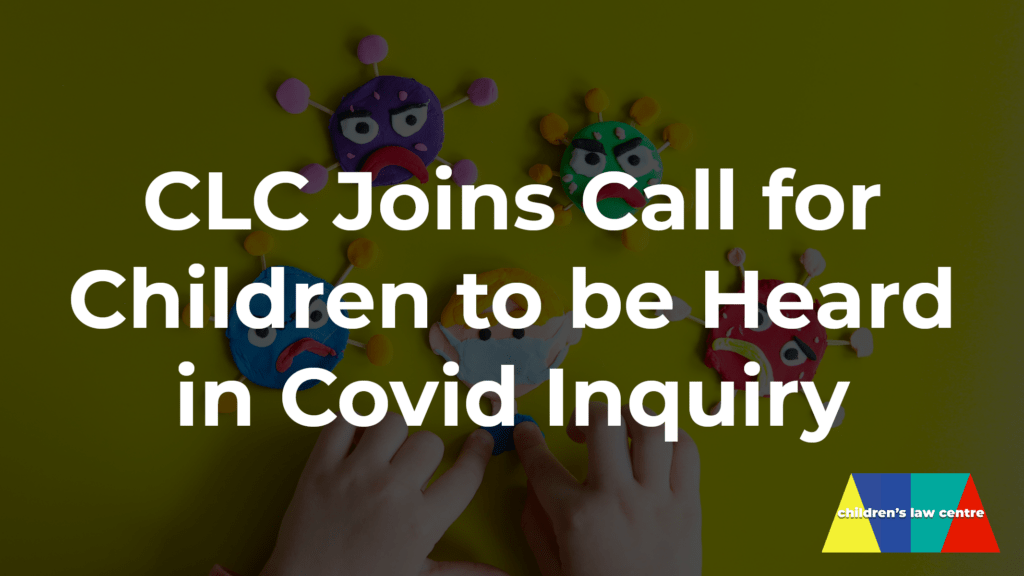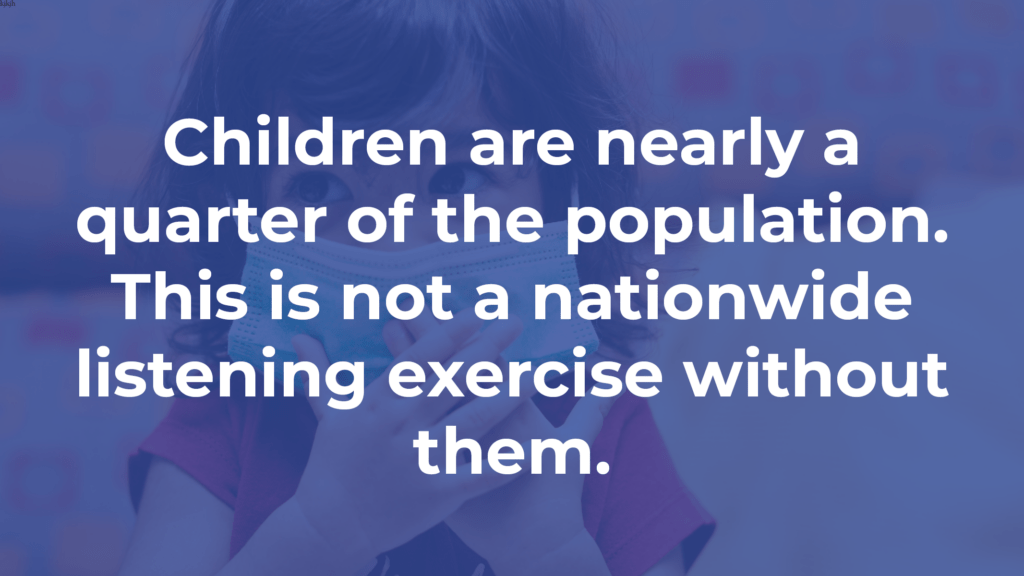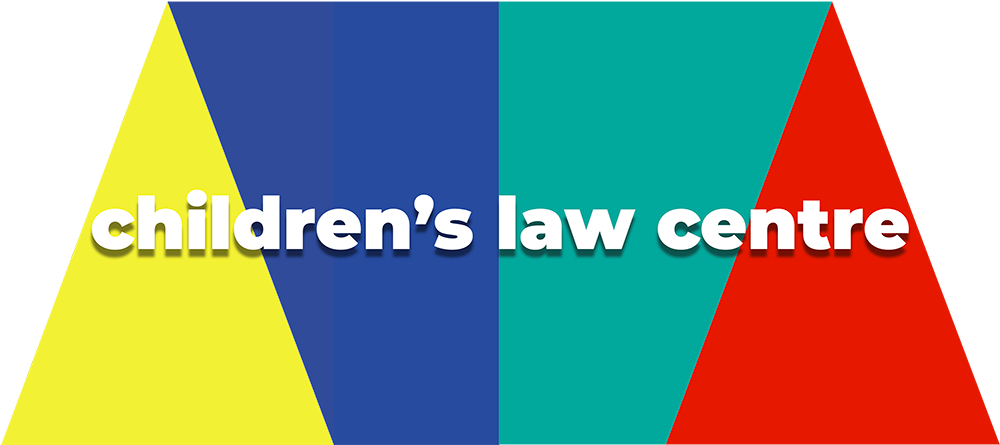CLC Joins Call for Children to be Heard in Covid Inquiry
14 August 2023

The Children’s Law Centre has joined calls for children to be given a voice as part of an inquiry into Covid.
The letter was published by Save the Children, Just for Kids Law and the Children’s Rights Alliance England. It was signed by over 40 leading children’s experts.
The letter calls for four commitments from the Chairperson of the inquiry. This includes publicly committing to hear directly from children about their experiences during the pandemic. In particular, this should include disadvantaged children who suffered disproportionately.

Full text of the letter reads:
‘EVERY STORY MATTERS’
To the Chair of the Inquiry,
We are writing as representatives of organisations which supported children, young people and families throughout the Covid-19 pandemic or advocated for their rights and academics specialising in this field. We believe that the Covid-19 inquiry must listen to the experiences of children and young people, so that through the Inquiry we are able to learn about how to prioritise children’s rights and wellbeing in future crises. We know that you are personally committed to this, as you have repeatedly stated in the Inquiry’s hearings so far.
The past few weeks have seen both the first public hearings in the Inquiry’s first Module and the launch of Every Story Matters (ESM). We are writing to express our increasing and ongoing concern about the absence of a clear and public strategy and approach for listening to children and young people, especially those who experience inequalities or discrimination. In order to address these concerns, we make some specific recommendations which draw on our collective experience in working with children and young people in ways which are empowering, safe, trauma-informed and can lead to lasting, positive change.
The recent advertising campaign for Every Story Matters (ESM), and the accompanying website emphasises that all stories are important, and al I stories should be told by those who wish to tell them.
But not children’s stories.
Just for Kids Law, the Children’s Rights Alliance for England and Save the Children have been repeatedly raising their concerns about the participation of children for the past nine months in their role as Core Participants in the Inquiry.
Despite this, and months of planning, ESM has been launched without a plan for how to involve children. Neither the website nor the advertising campaign makes any mention that this is an adult only activity. It is only when children attempt to fill in the webform that they will be met by this message:
“You must be aged 18 or over to use this form. The Inquiry is aware of the importance of understanding the experience of young people during the pandemic. The Inquiry is currently designing an effective way of engaging with children and young people and will provide updates on our website and social media.”
There is no direction or explanation of what a child reading this is then supposed to do with their experience. Children are nearly a quarter of the population. This is not a nationwide listening exercise without them.
Dame Sally Davies, the Chief Medical Officer between 2010-2019, has given evidence to you during Module 1’s public hearings, about the damage she has personally witnessed to children as a result of lockdown and the closure of schools 1:
“We have damaged a generation and it is awful[. … }, watching these young people struggle; and I know in the pre-school they haven’t learned how to socialise and play properly, they haven’t learned how to read at school. We must have plans for those.”
In this Inquiry you will be considering those plans that Dame Sally referred to, and how we protect future generations of children from suffering a repeat of the damage that was inflicted on our children when the next pandemic happens. You will need to hear stories from children to fully understand that damage, socially, mentally and academically and to hear what they have lost. You will also need to hear about their positive experiences, the examples of effective interventions and what we can learn from what worked well for children. You have made a commitment to put inequalities at the heart of the Inquiry and children who also experience inequalities and discrimination in addition to being a child, may be the most difficult to reach, but are also the most important to hear from.
We write now to call on you to make four public commitments:
First, in line with your commitment that the Inquiry will focus on inequalities, that you make a commitment to hear from children, and in particular from those who have suffered the most, that is those who come from disadvantaged background or experience other inequalities or discrimination.
Second, that the exercise is carried out in a manner that is appropriate, child-focused and trauma- informed, taking into account best practice for children’s participation. To this end the exercise should be carried out by an expert partnership with academic participatory research expertise, together with a support partner able to offer trauma-informed care, together with local community organisations with roots and credibility in particular communities which experience inequalities and discrimination.
Third, that the Inquiry set out the clear purpose of this exercise with a commitment that the findings from this research will directly inform the scope of the children’s module. The Inquiry should publicly set out how children’s voices have influenced lines of inquiry once the research has been conducted.
Finally, there needs to a be a published update on the Inquiry’s website as to how and when the Inquiry will listen to children.
Quite simply all of those under 18 who wish to participate in the Covid-19 inquiry are entitled to know when and how their stories will be heard. We ask that you tell them.
SIGNED:
- Dan Paskins, Director of UK Impact, Save the Children Fund
- Louise King, Director, Children’s Rights Alliance for England, part of Just for Kids Law
- Saqib Deshmukh, Interim Chief Executive, Alliance for Youth Justice
- Emma Rigby, CEO, Association for Young People’s Health
- Joseph Howes, CEO, Buttle UK
- John Galloway, Member, The Campaign for State Education (CASE)
- Professor Cath Larkins, Co-Director, The Centre for Children and Young People’s Participation, University of Central Lancashire
- Professor Tony Bertram, Director, Centre for Research in Early Childhood (CREC)
- Professor Chris Pascal, Director, Centre for Research in Early Childhood (CREC)
- Amy Whitelock Gibbs, Chair, The Children and Young People’s Mental Health Coalition
- Kathy Evans, Chief Executive, Children England
- Dr Judith Turbyne, Chief Executive, Children in Scotland
- Paddy Kelly, Director, Children’s Law Centre
- Stephen Kingdom, Campaign Manager, Disabled Children’s Partnership
- Melian Mansfield, Chair, Early Childhood Forum
- Patricia Durr, CEO, ECPAT UK
- Sarah Thomas, CEO, The Fostering Network
- Sereena Keymatlian, Director, Haringey Play Association
- Andrea Coomber KC (Hon.), Chief Executive, The Howard League for Penal Reform
- Ali Fiddy, CEO, IPSEA (Independent Provider of Special Education Advice)
- Katie Fennell, National Coordinator, KIND UK
- Fiona Sutherland, Director, London Play
- Silvia Hurtado, Director, The Markfield Project
- Anna Skehan, Supervising Solicitor and Legal Practice Lead, MiCLU (Migrant and Refugee Children’s Legal Unit) Islington Law Centre
- Dr Nick Owen, MBE, CEO, The Mighty Creatives
- Anna Feuchtwang , Chief Executive, National Children’s Bureau (NCB)
- Phil Kerry, CEO, New Horizons Youth Centre
- Zahra Bei, Co-Founder, No More Exclusions
- Sir Peter Wanless, CEO, NSPCC
- Rita Waters, Group Chief Executive (England and Wales), NYAS (National Youth Advocacy Service)
- Moira Sinclair, Chief Executive, Paul Hamlyn Foundation
- Ingrid Skeels and Alice Ferguson, Co-Directors, Playing Out
- Julie Randles, CEO, Power2
- Bill Badham, Co-Director, Practical Participation
- Sherry Peck, CEO, Safer London
- Dr Caron Carter, Senior Lecturer in Childhood & Early Childhood Education & Postgraduate Research Tutor in Education, Sheffield Hallam University
- Professor Alison Clark, Honorary Senior Research Fellow, Thomas Coram Research Unit, UCL Yvonne MacNamara, CEO, The Traveller Movement
- Claire O’Meara, Director of Advocacy, The UK Committee for UNICEF (UNICEF UK)
- Helen Lomax, Professor of Childhood, University of Huddersfield
- Arabella Skinner, Director, Us for Them
- Professor Jacqueline Barnes, Chair, What About The Children?
- Tricia Johnson, Committee Member
- Edwina Mitchell, Independent Researcher

